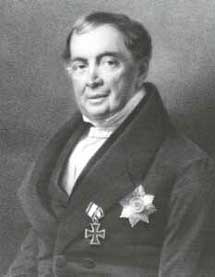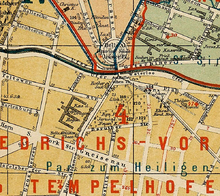Christian Rother
Christian Rother , von Rother since 1847 (born November 14, 1778 in Ruppersdorf near Strehlen ; † November 7, 1849 at Gut Rogau near Parchwitz ) was a Prussian Minister of State. For 28 years he was head of the maritime trade and first president of the Prussian Bank .
Early and Warsaw time
His parents were George Friedrich Rother († 1831) and his wife Anna Helena Ast (* 1751). Rother came from a simple farming background with no more than village schooling, who despite talent was denied a higher education, but who instead always continued his education independently.
In 1792, at the age of 14, he joined the tax office of Neumarkt in Lower Silesia as an apprentice . During a two-year apprenticeship there, he acquired basic knowledge of accounting and cash management. Faced with the choice of becoming a Prussian military service or a private secretary with no salary in the Prussian civil service, Rother preferred the position of a private secretary at the War and Tax Council in Neustadt in Upper Silesia . After the third partition of Poland , Rother went to Warsaw as the private secretary of Lieutenant General von Mengden in the new Prussian province of South Prussia . In 1797 he became an assistant to the War and Domain Chamber . In 1806 Rother became a chancellery inspector at the Warsaw Police Department.
After Napoleon formed the Duchy of Warsaw as part of the Kingdom of Saxony in 1807 , Rother stayed in Warsaw without - despite a corresponding offer - entering the service of the new Saxon government. In 1809 he was taken into custody by the Saxon government on suspicion of high treason for his correspondence with the Prussian baron vom Stein , but was released after seven weeks due to lack of evidence.
Rise in Prussian finance
From Warsaw Rother went to Königsberg , the alternative capital of Prussia, as long as Berlin was occupied by French troops. After he had attracted attention from the State Chancellery in 1809 with a treatise on the "treasury at the higher authorities", he was appointed by the Prince of Hardenberg . From 1810 he was a calculator at the General-Staatskasse in Berlin and from 1812 an accountant in Berlin. As Hardenberg's financial policy advisor, he campaigned for the revival of trade and industry and thus contributed to preventing Prussia's bankruptcy after the wars against Napoleon . In 1815 Rother was the Prussian commissioner for distributing the French war indemnities. In the same year he became director of the Central Bureau in the Ministry of Finance with the title of a real Secret Chief Finance Council. From 1817 Rother was a member of the Prussian State Council .
Chief of Maritime Trade
From 1820 to 1848 he was Royal Commissarius and Head of the Maritime Trading Company . He was also the President of the Central Government Debt Administration . In 1831 Rother was appointed director of the royal main bank . In 1835 he was promoted to the real secret council with the title Excellency. From 1835 to 1837 Rother was then head of the administration for trade, manufacture and construction. In 1836 he became a member of the State Ministry and secret Minister of State. From 1837 to 1848 Rother was president of the royal main bank, and since 1844 a member of the trade council. His long-term colleague August Friedrich Bloch was his successor as President of the Sea Trade .
Rother always placed particular emphasis on eliminating social grievances. As head of the maritime trade, he has specifically set up industrial companies in impoverished areas of Prussia and provided fair wages and social benefits and facilities for the employees in these companies, such as health insurance companies. The social measures for which Rother took care of the people of the lower class - from which he himself came - he introduced around 50 years before the social laws of the German Reich .
From 1824 to 1827 Harry Maitey , the first Hawaiian to come to Prussia with Mentor , lived in his house in Berlin.
Appreciation
In 1847, on the occasion of his fiftieth service anniversary, the state banker was given the title of Knight of the Order of the Black Eagle in addition to being raised to the nobility . He also became an honorary citizen of the city of Berlin . Two years later Rother died on his Rogau estate in Silesia.
An episode from his life (the procurement of a large, urgently needed loan for the Prussian state from the London Rothschild Bank) was filmed in 1986 for ARD under the title Christian Rother - Banker for Prussia .
family
He married in Driesen in 1800 Juliane eingrüber († 1829) from Friedberg (Neumark). After the death of his first wife, he married Mathilde Eckard († 1869) in Berlin in 1830 . He had a son from his first marriage: Julius (1808–1874, ennobled 1837), Herr auf Rogau and Koitz and the Prussian councilor. His grandson Julius (1834–1899) was a district administrator in the Lüben district.
literature
- Bärbel Holtz: Rother, Christian von. In: New German Biography (NDB). Volume 22, Duncker & Humblot, Berlin 2005, ISBN 3-428-11203-2 , p. 121 f. ( Digitized version ).
- Viktor Loewe: Christian von Rother , in: Schlesische Lebensbilder , Vol. 1, 1922, pp. 314–318 ( digitized version )
- Karl Wippermann : Rother, Christian von . In: Allgemeine Deutsche Biographie (ADB). Volume 29, Duncker & Humblot, Leipzig 1889, p. 360 f.
- Rolf Keller, Christian von Rother as President of the Sea Trade , Dittmann, 1930
Web links
- Literature by and about Christian Rother in the catalog of the German National Library
- Biography of Rother ( Memento from March 11, 2013 in the Internet Archive )
- Biography of the Berlin State Library
Individual evidence
- ^ Wolfgang Radtke: The Prussian sea trade. Page 22, in Wolfgang Kirchner / Wolfgang Radtke: Banker for Prussia , Verlag Nicolai, Berlin 1987, ISBN 3-87584-194-8
- ^ Wolfgang Radtke: The Prussian sea trade. Page 23, in Wolfgang Kirchner / Wolfgang Radtke: Banker for Prussia , Verlag Nicolai, Berlin 1987, ISBN 3-87584-194-8
- ↑ cf. Today in Kreuzberg: May 4th - The Boys´ Borstal School before the gate to Halle ( Memento from July 15, 2015 in the Internet Archive )
- ^ Wolfgang Radtke: The Prussian sea trade. Pages 54–60, in Wolfgang Kirchner / Wolfgang Radtke: Banker for Prussia , Verlag Nicolai, Berlin 1987, ISBN 3-87584-194-8
- ↑ Dietmar Pertsch: Jüdische Lebenswelten in Feature Films and TV Games: Films on the History of the Jews from their Beginnings to Emancipation in 1871 , Walter de Gruyter, 1992, p. 158 ff. The film was available on YouTube on April 10, 2018.
| personal data | |
|---|---|
| SURNAME | Rother, Christian |
| ALTERNATIVE NAMES | Rother, Christian von |
| BRIEF DESCRIPTION | Prussian Finance Minister |
| DATE OF BIRTH | November 14, 1778 |
| PLACE OF BIRTH | Ruppersdorf near Strehlen |
| DATE OF DEATH | November 7, 1849 |
| Place of death | Parchwitz |

